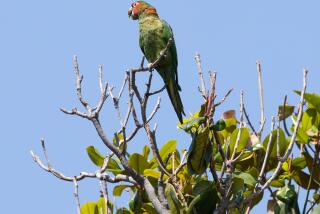Rambunctious Rabbits a Hop, Skip and Jump From Jets
- Share via
ROISSY-EN-FRANCE, France — Jumbo jets roar in and out of Roissy Charles de Gaulle airport in a steady stream, but those on the grassy tracks between the runways barely twitch a furry ear.
Rabbits are everywhere around Paris’ biggest airport, eating their way through an occasional electrical wire and burrowing under runways and taxiways.
Protected by fences from their natural predators outside, they have bred like, well, rabbits--more than 50,000 roam the grounds, authorities guess.
They haunt the shrubs and lawns of office buildings surrounding the terminals. At night they eat bark off the airport’s trees.
They sun themselves alongside the runways, hundreds of small brown and white dots among the jumbo jets. But they tend to avoid the tarmac and pose no danger to planes. The huge colony has taken over the forests and cornfields on the airport’s 7,900 acres, driving out their meeker cousins the hares and other species on the strength of sheer numbers.
In a largely futile effort, the authorities have fought for 20 years to reduce the rabbit population, which thrives on abundant grass and mushrooms.
Game warden Jean Valissant heads the battle. Every few days, he leads a team of five hunters and four ferrets in a skirmish.
“They’re next to the runways with the loud noise of the planes and they don’t care, but when they hear a hunter approaching they take off,” Valissant said.
The hunters say they usually bag around 60 rabbits a day.
On a recent cold sunny morning, the ferrets chased a dozen rabbits from their holes into waiting nets as airliners took off and landed nearby and the engines of an idling Concorde supersonic jetliner thundered just yards away.
“The ferrets, the rabbits, the men--we’re all used to the sound here,” said Gilbert Leroy, a retired policeman and a regular ferreter since the airport’s war with the rabbits began 20 years ago.
The teams release their catch in the far reaches of the airport, where airport and airline employees are invited to hunt them.
Valissant said the Roissy rabbits taste like any other caught in the wild, “especially in pate.” A reporter’s taste test found a rich, subtly spicy and smoky flavor with not a hint of jet fuel.
Aside from man, “their only predator here is natural death, and the female rabbit has babies six months after it’s born,” said Joel Genty, in charge of Roissy’s infrastructure and environment.
More to Read
Sign up for Essential California
The most important California stories and recommendations in your inbox every morning.
You may occasionally receive promotional content from the Los Angeles Times.








